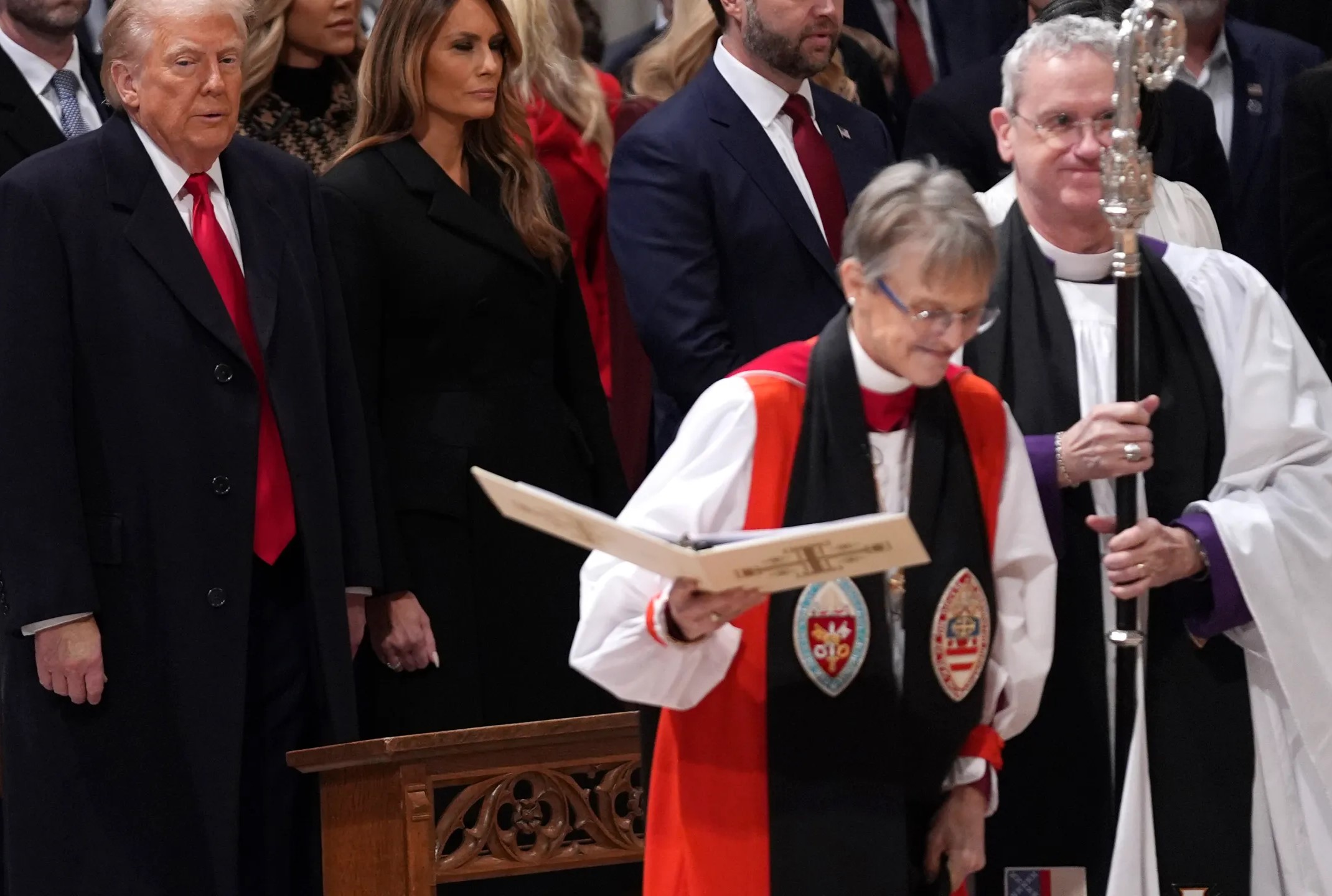The inauguration of Donald Trump as the 47th President of the United States drew millions of viewers, both in the United States and around the world. Amid the pomp and circumstance of the historic day, one moment at the inaugural prayer service at Washington’s National Cathedral sparked significant discussion and controversy.
Episcopal Bishop Mariann Budde delivered a bold and uncompromising sermon that directly addressed President Trump and his administration’s early actions. The bishop’s words were a plea for compassion, inclusivity, and unity, but her forthrightness surprised many and quickly became a focal point of debate.
A Sermon That Turned Heads
As is customary during inaugurations, a prayer service was held to seek divine guidance for the new administration. Bishop Budde’s sermon, however, veered from traditional platitudes and instead directly tackled pressing social and political issues.
“Let me make one final plea, Mr. President,” Budde said during her 15-minute address. “Millions have put their trust in you. And as you told the nation yesterday, you have felt the providential hand of a loving God. In the name of our God, I ask you to have mercy upon the people in our country who are scared now.”
Her words, delivered with conviction, were pointed and deliberate. She referenced the fear gripping marginalized communities, particularly LGBTQIA+ individuals, immigrants, and refugees. Her plea resonated with some as a call for empathy and unity, but others viewed it as a rebuke of the president’s policies.
Addressing Policy Decisions
Bishop Budde’s sermon followed a day of sweeping executive orders signed by President Trump. These included controversial directives on immigration, the declaration of a national emergency at the southern border, and an order emphasizing biological distinctions between men and women. The latter was viewed as a direct affront to LGBTQIA+ rights, sparking outrage among activists and community leaders.
In her sermon, Budde addressed these actions head-on:
“The people who pick our crops and clean our office buildings; who labor in poultry farms and meatpacking plants; who wash the dishes after we eat in restaurants and work the night shifts in hospitals—they may not be citizens or have the proper documentation. But the vast majority of immigrants are not criminals. They pay taxes and are good neighbors.”
Her words underscored the contributions of undocumented immigrants to the nation’s economy and culture. She also urged the president to consider the human impact of his policies, particularly on children and families torn apart by immigration enforcement.
A History of Criticism
Bishop Budde is no stranger to controversy when it comes to her critique of Donald Trump. She gained national attention in 2020 when Trump posed for a photo outside St. John’s Episcopal Church holding a Bible, shortly after law enforcement used chemical agents to disperse racial justice protesters in the area. Budde publicly condemned the president’s actions, stating, “Everything he has said and done is to inflame violence… We need moral leadership, and he’s done everything to divide us.”
Her inaugural sermon continued this pattern of outspoken criticism. While some applauded her courage, others were quick to denounce her words as inappropriate for the occasion.
Mixed Reactions
The response to Budde’s sermon was as divided as the nation itself. Republican Representative Mike Collins of Georgia took to social media, posting on X (formerly Twitter), “The person giving this sermon should be added to the deportation list.” This inflammatory comment reflected the sentiments of many Trump supporters who viewed the sermon as an unwarranted attack on the president.
In contrast, others praised Budde for using her platform to advocate for marginalized groups. Online discussions were filled with messages of support, with one commenter writing, “Her sermon wasn’t an attack—it was a call for compassion and humanity. Exactly what we need right now.”
Trump’s Reaction
Throughout the sermon, both President Trump and Vice President J.D. Vance remained stoic, showing little outward reaction to Budde’s pointed remarks. When asked later about the service, Trump told reporters, “I didn’t think it was a good service.” His curt response revealed little about his deeper thoughts on the sermon’s content.
A Call for Compassion
At the heart of Budde’s sermon was a plea for mercy and understanding. Her closing words were a poignant reminder of the struggles faced by many in the nation:
“I ask you to have mercy, Mr. President, on those in our communities whose children fear that their parents will be taken away. And that you help those who are fleeing war zones and persecution in their own lands to find compassion and welcome here. Our God teaches us that we are to be merciful to the stranger, for we were all once strangers in this land.”
For her supporters, these words encapsulated the moral leadership many feel is lacking in today’s political climate. For her detractors, they were seen as a divisive and inappropriate use of a sacred occasion.
A Moment That Will Be Remembered
The inaugural prayer service at the National Cathedral is traditionally a time for unity and reflection. Bishop Budde’s sermon, however, underscored the deep divisions within the country and the challenges facing the new administration.
Whether seen as a courageous stand or an overstep, Budde’s words will undoubtedly remain a defining moment of Trump’s second inauguration. They serve as a reminder of the power of faith leaders to challenge authority and advocate for justice, even in the most controversial of circumstances.

